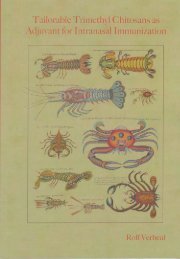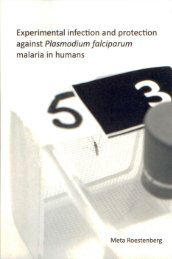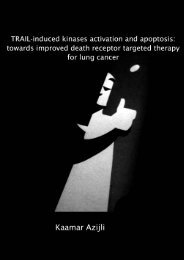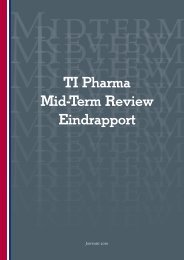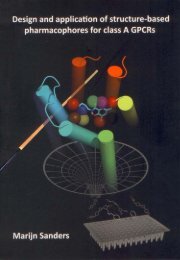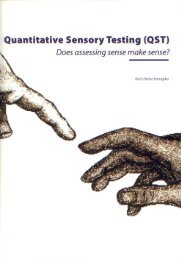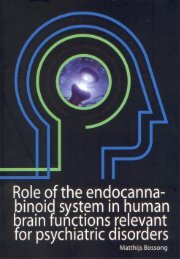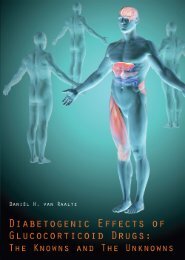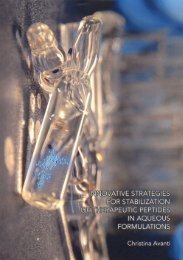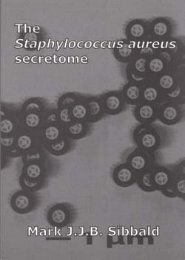The vagus nerve as a modulator of intestinal inflammation - TI Pharma
The vagus nerve as a modulator of intestinal inflammation - TI Pharma
The vagus nerve as a modulator of intestinal inflammation - TI Pharma
You also want an ePaper? Increase the reach of your titles
YUMPU automatically turns print PDFs into web optimized ePapers that Google loves.
Summary and conclusions<br />
<strong>The</strong> goal <strong>of</strong> this thesis w<strong>as</strong> to further unravel the working mechanism <strong>of</strong> the so-called<br />
‘cholinergic anti-inflammatory pathway’, specifically in <strong>intestinal</strong> <strong>inflammation</strong>. <strong>The</strong><br />
pioneering work <strong>of</strong> Tracey and colleagues h<strong>as</strong> demonstrated that the <strong>vagus</strong> <strong>nerve</strong>,<br />
via its neurotransmitter acetylcholine (ACh), h<strong>as</strong> an important role in limiting the<br />
inflammatory response 1 . Subsequently, several studies have demonstrated that<br />
cholinergic activation ameliorates dise<strong>as</strong>e in a range <strong>of</strong> animal models such <strong>as</strong><br />
ischaemia-reperfusion injury 2 , hemorrhagic shock 3 , peritonitis 4 , DSS-colitis 5 and<br />
rheumatoid arthritis 6 .<br />
In this thesis, we focused on the role <strong>of</strong> cholinergic modulation in <strong>intestinal</strong><br />
<strong>inflammation</strong>. <strong>The</strong> g<strong>as</strong>tro-<strong>intestinal</strong> tract is under strict control <strong>of</strong> the <strong>vagus</strong> <strong>nerve</strong> 7,8 ,<br />
rendering it susceptible to cholinergic immuno-modulation. Moreover, especially<br />
in the intestine, which homes our largest collection <strong>of</strong> microbes, tight regulation <strong>of</strong><br />
immune responses to discriminate between self and non-self is crucial. An imbalance<br />
<strong>of</strong> this process h<strong>as</strong> consequences and may lead to dise<strong>as</strong>e. An example <strong>of</strong> this is<br />
inflammatory bowel dise<strong>as</strong>e (IBD), including Crohn’s dise<strong>as</strong>e and ulcerative colitis<br />
(UC), which is caused by an inappropriate and exaggerated mucosal immune response<br />
to constituents <strong>of</strong> the gut flora in genetically predisposed individuals. Chapter 2 gives<br />
an overview <strong>of</strong> the current knowledge regarding cholinergic modulation <strong>of</strong> <strong>intestinal</strong><br />
<strong>inflammation</strong>. This review discusses advances in the possible mechanisms via which<br />
the <strong>vagus</strong> <strong>nerve</strong> can mediate the immune response, <strong>as</strong> well <strong>as</strong> the role <strong>of</strong> nAChR<br />
activation and signaling on macrophages and other immune cells. Moreover, the<br />
clinical implications <strong>of</strong> the anti-inflammatory properties <strong>of</strong> <strong>vagus</strong> <strong>nerve</strong> signaling are<br />
discussed.<br />
JAK2-STAT3 signaling in cholinergic modulation <strong>of</strong> the<br />
immune response<br />
<strong>The</strong> ‘cholinergic anti-inflammatory pathway’ is characterized by a dose-dependent<br />
decre<strong>as</strong>e in the production <strong>of</strong> proinflammatory mediators via activation <strong>of</strong> nicotinic<br />
acetylcholine receptors (nAChR) on macrophages 1 . Many reports point towards the<br />
macrophage nAChR α7 <strong>as</strong> an essential player in mediating the anti-inflammatory<br />
effect <strong>of</strong> ACh 9, 10-12 . Wang et al showed that activation <strong>of</strong> the nAChR α7 inhibits<br />
transcriptional activity <strong>of</strong> the transcription factor NF-KBp65 9,13 , resulting in<br />
reduced cytokine production. In chapter 3, we evaluated the involvement <strong>of</strong> the<br />
transcription factor STAT3 in this process, since STAT3 is a potential negative<br />
regulator <strong>of</strong> inflammatory responses 14,15 . We demonstrated that nicotine exerts its<br />
anti-inflammatory effect on peritoneal macrophages via nAChR α7-Jak2 and STAT3<br />
signaling in vitro. In vivo, we tested the involvement <strong>of</strong> STAT3 in the cholinergic<br />
anti-inflammatory pathway in an animal model <strong>of</strong> postoperative ileus (POI). POI is<br />
characterized by general hypomotility <strong>of</strong> the g<strong>as</strong>tro<strong>intestinal</strong> tract and delayed g<strong>as</strong>tric<br />
133



